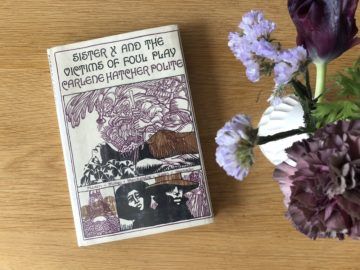Lucy Scholes at The Paris Review:
 The Flagellants, the American writer Carlene Hatcher Polite’s debut novel, is one of those out-of-print books that’s been lurking in the corner of my eye for the past few years. First published by Christian Bourgois éditeur as Les Flagellants in Pierre Alien’s 1966 French translation, and then in its original English the following year by Farrar, Straus and Giroux, the book details the stormy relationship between Ideal and Jimson, a Black couple in New York City. The narrative is largely made up of a series of stream of consciousness orations. Polite’s prose is frenetic and loquacious, and her characters fling both physical and verbal violence back and forth across the page. The French edition received much praise. Polite was deemed “a poet of the weird, an angel of the bizarre,” and the novel was described as “so haunting, so rich in thoughts, sensations, so well located in a poetic chiaroscuro that one [could] savor its ineffaceable harshness.” And while certain American critics weren’t so impressed—“Miss Polite’s narrative creaks with the stresses of literary uncertainty,” wrote Frederic Raphael in the New York Times, summing the novel up as a “dialectical diatribe”—others recognized this young Black woman’s singular, if still rather raw and emergent, talent. Malcolm Boyd, for example, declared the novel “a work of lush imagery and exciting semantic exploration.” It won Polite—then in her midthirties and living in Paris with the youngest of her two daughters—fellowships from the National Foundation for the Arts and Humanities (1967) and the Rockefeller Foundation (1968).
The Flagellants, the American writer Carlene Hatcher Polite’s debut novel, is one of those out-of-print books that’s been lurking in the corner of my eye for the past few years. First published by Christian Bourgois éditeur as Les Flagellants in Pierre Alien’s 1966 French translation, and then in its original English the following year by Farrar, Straus and Giroux, the book details the stormy relationship between Ideal and Jimson, a Black couple in New York City. The narrative is largely made up of a series of stream of consciousness orations. Polite’s prose is frenetic and loquacious, and her characters fling both physical and verbal violence back and forth across the page. The French edition received much praise. Polite was deemed “a poet of the weird, an angel of the bizarre,” and the novel was described as “so haunting, so rich in thoughts, sensations, so well located in a poetic chiaroscuro that one [could] savor its ineffaceable harshness.” And while certain American critics weren’t so impressed—“Miss Polite’s narrative creaks with the stresses of literary uncertainty,” wrote Frederic Raphael in the New York Times, summing the novel up as a “dialectical diatribe”—others recognized this young Black woman’s singular, if still rather raw and emergent, talent. Malcolm Boyd, for example, declared the novel “a work of lush imagery and exciting semantic exploration.” It won Polite—then in her midthirties and living in Paris with the youngest of her two daughters—fellowships from the National Foundation for the Arts and Humanities (1967) and the Rockefeller Foundation (1968).
more here.
